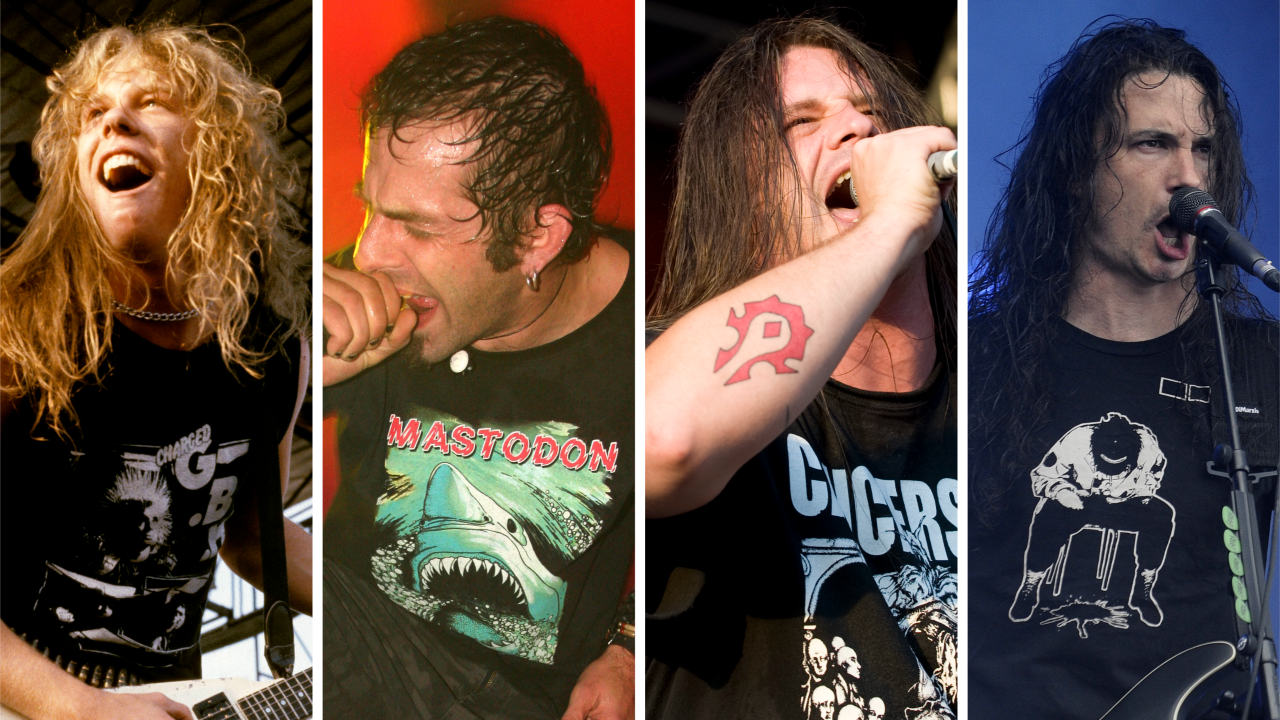The 10 heaviest metal breakdowns of all time
When the beat drops, these songs by Metallica, Slayer and more hit like a freight train

Select the newsletters you’d like to receive. Then, add your email to sign up.
You are now subscribed
Your newsletter sign-up was successful
Want to add more newsletters?

Every Friday
Louder
Louder’s weekly newsletter is jam-packed with the team’s personal highlights from the last seven days, including features, breaking news, reviews and tons of juicy exclusives from the world of alternative music.

Every Friday
Classic Rock
The Classic Rock newsletter is an essential read for the discerning rock fan. Every week we bring you the news, reviews and the very best features and interviews from our extensive archive. Written by rock fans for rock fans.

Every Friday
Metal Hammer
For the last four decades Metal Hammer has been the world’s greatest metal magazine. Created by metalheads for metalheads, ‘Hammer takes you behind the scenes, closer to the action, and nearer to the bands that you love the most.

Every Friday
Prog
The Prog newsletter brings you the very best of Prog Magazine and our website, every Friday. We'll deliver you the very latest news from the Prog universe, informative features and archive material from Prog’s impressive vault.
Breakdowns are the heart of a great many metal genres. Why? Because they’re always barbaric as all hell when they hit. Few things sonically strike like a moment of quiet followed by every instrument firing at full force, and these are the 10 times that such sections of a song blasted us most ruthlessly. From Metallica to Gojira, these are the most malevolent of all the breakdowns in heavy metal history.

Metallica – Creeping Death (Ride The Lightning, 1984)
Ride The Lightning saw Metallica start to shed their thrash metal skin and, in the process, mastermind some of the heaviest music ever. For Whom The Bell Tolls and The Call Of Ktulu are bona fide boot-stompers, while Creeping Death boasts a neck-snapping breakdown. Although guitarist Kirk Hammett originally wrote that “Die by my hand!” section for his first band Exodus, the Four Horsemen wielded it with much more malicious intent.
Lamb Of God – Laid To Rest (Ashes Of The Wake, 2004)
“See who gives a fuck!” With that one clarion call, every single person at a Lamb Of God show goes apeshit, and who can blame them? The moment heralds Laid To Rest’s transformation from a fast-fingered metal anthem to pure, animalistic groove. The breakdown opened the Ashes Of The Wake album with such an adrenaline shot that no one was shocked when it became the band’s breakthrough release.
Slayer – Raining Blood (Reign In Blood, 1986)
Most discussions of Raining Blood revolve around that formidable opening, where cracking thunder gives way to one of metal’s most iconic riffs. However, the latter half of Slayer’s signature song is carried by that breakdown, which bypasses rational thought and catches you straight in the “fat riff and simple drumbeat”-loving part of your brain. When Kerry King adds that melodic lead on top halfway through, it grows even more badass.
Gojira – Flying Whales (From Mars To Sirius, 2005)
It’s one thing when an audience goes wild, but when a breakdown also makes the band playing it lose their minds, that’s the sign of something truly special. Such is the case with Flying Whales, which drives the members of Gojira rabid, running around all over the show, when it strikes its crescendo. The Morbid Angel pick-scrapes only reaffirm the unholy level of heaviness being tapped into by this modern death metal classic.
Machine Head – Davidian (Burn My Eyes, 1994)
Davidian is nasty throughout. From Robb Flynn’s roars to the pinch harmonics and squealing guitar solo, there’s no give in its upfront groove metal assault. This makes it stunning when, at its conclusion, Machine Head somehow reach even further frontiers of sonic destruction. An outward breath from Flynn incites a no-nonsense chugathon, and the violence that plays during the video is pretty accurate as to what happens when this moment hits at live shows, too.
Trivium – Pull Harder On The Strings Of Your Martyr (Ascendancy, 2005)
A lot of breakdowns either don’t feature vocals or take a minute to rebuild back up to them. Pull Harder On The Strings Of Your Martyr doesn’t have time for that shit. When the beat drops after this Ascendancy single’s second chorus, singer/guitarist Matt Heafy immediately starts snarling, only punctuating the sheer, bollock-popping savagery of the whole thing. It’s a big reason why this is Trivium’s most-played song by far.
Sign up below to get the latest from Metal Hammer, plus exclusive special offers, direct to your inbox!
Meshuggah – Demiurge (Koloss, 2012)
Picking the best Meshuggah breakdown borders on the impossible, but we’ve gone with Demiurge because… holy fuck! It’s just perfect. From the intense build-up to that moment of brief silence, then the crash of guitars and drums and that hellacious melody, it’s a section of heavy metal artistry worthy of the Louvre. If breakdowns were taught in schools, this would be an essential text on every single student’s curriculum.
Cannibal Corpse – Hammer Smashed Face (Tomb Of The Mutilated, 1992)
As much as people like to talk about the growls, neck and windmilling of Corpsegrinder, bassist Alex Webster and drummer Paul Mazurkiewicz have always been the unsung powerhouses of Cannibal Corpse. And Hammer Smashed Face proves it. The death metal mainstay slides into its breakdown as smoothly as butter, yet it still gets heads instinctively banging. It’s the most brutal part of a song crammed with seismic shifts in speed.
Sepultura – Dead Embryonic Cells (Arise, 1991)
Sepultura were already kings of thrash by 1991 (as evidenced by major-label breakthrough Beneath The Remains), and on Arise they began to foresee greater things. While maintaining the Brazilians’ speed metal core, the album dabbled in industrial soundscapes, and Dead Embryonic Cells shovelled in buttloads of groove. The entire thing’s punishing but, before you hear the stomping drums and open E-strings towards the end, we’d recommend taking out some insurance on your neck.
Converge – Eagles Become Vultures (You Fail Me, 2004)
No discussion of imposing breakdowns would be complete without casting an eye to the pioneering New England metalcore scene, and we’re anointing Converge as its representatives. The Massachusetts wildmen always had a technical-yet-incensed take on their genre, as proven by Eagles Become Vultures’ ending. When the song’s rampage of noise slows to a section of hefty riffing and atypical drumming, it’s just primal enough for you to understand that craniums need to move pronto.

Louder’s resident Gojira obsessive was still at uni when he joined the team in 2017. Since then, Matt’s become a regular in Metal Hammer and Prog, at his happiest when interviewing the most forward-thinking artists heavy music can muster. He’s got bylines in The Guardian, The Telegraph, The Independent, NME and many others, too. When he’s not writing, you’ll probably find him skydiving, scuba diving or coasteering.
